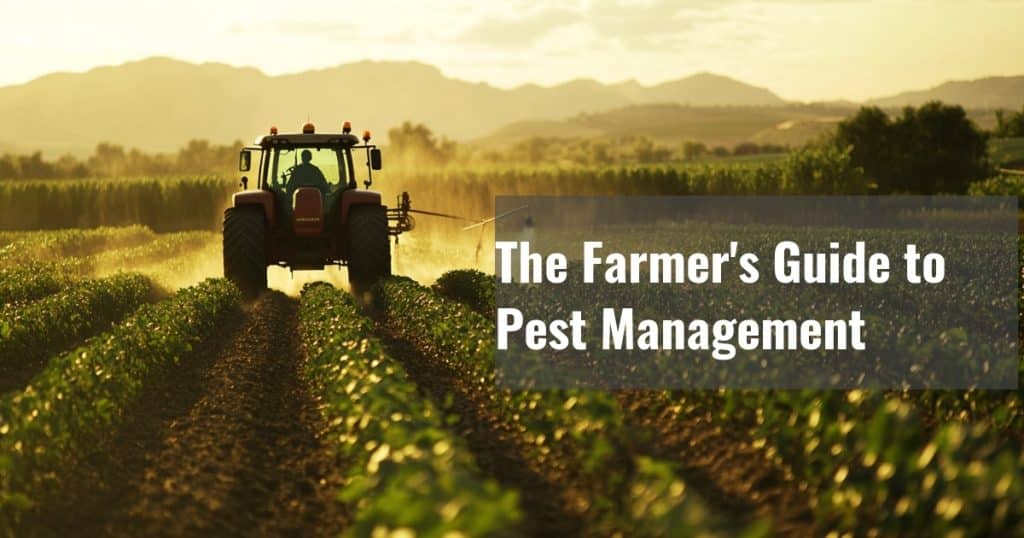
As a farmer, you know that protecting your crops and livestock from pests is essential for maintaining a thriving agricultural business. Effective farm pest management strategies are crucial to minimising damage and ensuring the health and productivity of your farm.
In this article, we’ll explore the world of agricultural pest management, focusing on eco-friendly methods and integrated pest management techniques that can help you keep your farm pest-free.
Table of Contents
Understanding Pests
In agricultural contexts, a pest is any organism that causes damage to crops, livestock, or farm infrastructure. Common agricultural pests include:
- Insects: Aphids, beetles, caterpillars, and frit flies
- Rodents: Mice and rats
- Diseases: Fungal, bacterial, and viral infections
To effectively manage pests, it’s important to understand their behaviour, life cycles, and vulnerabilities. By knowing your enemy, you can develop targeted strategies that minimise damage while preserving the environment.
Preventative Strategies
Prevention is key when it comes to farm pest management. By implementing proactive measures, you can reduce the likelihood of pest infestations and minimise the need for more aggressive control techniques. Some effective preventative strategies include:
- Healthy Soil Practices: Maintaining healthy soil through proper fertilisation, irrigation, and cultivation can help deter pests by promoting strong, resilient plants.
- Crop Rotation: Rotating crops helps break pest life cycles and prevents the buildup of pest populations in specific areas.
- Pest-Resistant Varieties: Choosing genetically or traditionally bred pest-resistant crop varieties can reduce the impact of pests on your harvest.
- Sanitation: Keeping your farm clean and free of debris can help prevent pest outbreaks by eliminating potential breeding sites and hiding places.
Eco-Friendly Control Techniques
When pests do appear, there are several eco-friendly control techniques you can employ to manage their populations without relying on harsh chemicals:
- Pheromone Traps: These traps use synthetic versions of pest pheromones to lure insects away from crops and into traps, reducing their numbers without harming beneficial organisms.
- Biological Control: Introducing natural predators or parasites of pests, such as ladybugs or parasitic wasps, can help keep pest populations in check.
- Mechanical Control: Physical barriers, such as row covers or netting, can prevent pests from accessing crops, while manual removal of pests can be effective for small infestations.
- Organic Pesticides: When necessary, organic pesticides derived from natural sources can be used to control pests while minimising environmental impact.
Integrated Pest Management (IPM)
Integrated Pest Management (IPM) is a holistic approach to pest control that combines biological, cultural, and chemical methods to minimise pest damage while being environmentally conscious. The steps for implementing IPM on your farm include:
- Monitoring: Regularly inspect your crops and livestock for signs of pest activity.
- Identification: Accurately identify the pests causing damage to determine the most appropriate control measures.
- Thresholds: Establish action thresholds based on the level of pest activity and potential economic impact.
- Control: Implement a combination of preventative, eco-friendly, and chemical control techniques as needed.
- Evaluation: Assess the effectiveness of your pest management strategies and adjust as necessary.
Conclusion
Managing pests in agriculture requires a proactive, integrated approach that prioritises prevention and eco-friendly control techniques. By understanding the pests that threaten your crops and livestock, implementing preventative strategies, and employing a range of control methods, you can effectively manage pest populations while minimising environmental impact.
At Strathearn Pest Control, we’re here to help you navigate the complexities of agricultural pest management. Our team of experts is dedicated to providing you with the knowledge, tools, and support you need to keep your farm pest-free and thriving, it’s crucial to prioritise safety and effectiveness.
FAQs
What are the most common agricultural pests?
Common agricultural pests include insects like aphids, beetles, and caterpillars; rodents such as mice and rats; and diseases caused by fungi, bacteria, and viruses.
How can farmers prevent pest infestations?
Farmers can prevent pest infestations by maintaining healthy soil, rotating crops, using pest-resistant varieties, and practising good sanitation.
What are some eco-friendly pest control methods?
Eco-friendly pest control methods include pheromone traps, biological control using natural predators or parasites, mechanical barriers, and organic pesticides.
How do I manage pest populations effectively using IPM?
To manage pest populations using IPM, follow these steps: monitor for pest activity, identify the pests, establish action thresholds, implement a combination of control techniques, and evaluate the effectiveness of your strategies.
What services does Strathearn Pest Control offer that can help manage pests in agriculture?
Strathearn Pest Control offers comprehensive pest assessments, customised IPM plans, eco-friendly control techniques, safe use of organic pesticides, and ongoing support to help farmers manage pests in agriculture.
Strathearn Pest Control Services
At Strathearn Pest Control, we understand the unique challenges faced by farmers in managing agricultural pests. Our team of experienced professionals offers tailored solutions for pest control in agricultural settings, helping you protect your crops and livestock while minimising environmental impact.
Our agricultural pest control services include:
- Comprehensive pest assessments and monitoring
- Customised integrated pest management plans
- Eco-friendly control techniques, such as biological control and pheromone traps
- Safe and effective use of organic pesticides when necessary
- Ongoing support and advice to help you maintain a pest-free farm
With our local expertise and commitment to sustainable pest management, Strathearn Pest Control is your trusted partner in protecting your agricultural business. Contact us today.

